
13 June 2025
The Myanmar Garment Manufacturers Association (MGMA) issued a statement on June 13 expressing deep concern for the CMP sector, which relies heavily on workers. This concern follows the International Labour Organization’s (ILO) decision to monitor Myanmar under Article 33 of the ILO Constitution during its 113th International Labour Conference, scheduled for June 2 to June 13, 2025.
The CMP sector in Myanmar includes the manufacturing of garments, bags, shoes, and electrical equipment, with factories operating on a buy-sell-buy (CMP) basis.
The CMP system is a business model where clients and international brands purchase raw materials and necessary accessories, have them manufactured in CMP factories, and then export the finished products to various countries according to client and brand specifications.
On average, factories in the CMP industry earn a commission of about 10 percent of the trade value. There are approximately 700,000 workers employed in CMP factories, with an estimated 1.4 million additional workers in related industries. The number of dependent family members is around four times that figure, totaling about 2.8 million.
In the Myanmar CMP industry, client brands from international markets only assign work to CMP factories if they can strictly adhere to the business ethics rules established by those clients.
In the Myanmar garment sector, out of the 523 member factories of the Myanmar Garment Manufacturers Association (MGMA), about 60 percent export to the European Union market, 20 percent to Japan, and the remaining 20 percent to other markets.
Factories within the CMP sector, which employ a significant number of workers, are required to adhere to the Continuous Improvement Monitoring Program established by the MGMA.
Furthermore, the MGMA will continue to collaborate with employers, workers, and government representatives, including the ILO, to enhance employer-employee relations in line with the recommendations of Article 33.
#ILO #MGMA #CMP sector #mtnews







